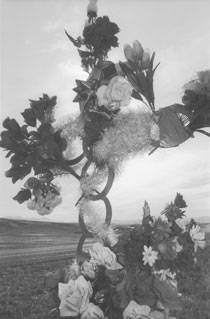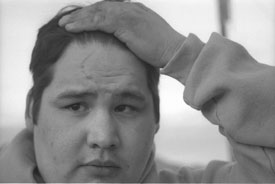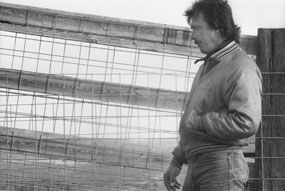| Summer 2004 |
Sovereignty
|
|
Rocky Boy's Reservation Case in Point Rocky Boy’s leaders want more experienced judges, but will appointing them entagle the judges in tribal politics? story by Alisha
Wyman
It stands taller; it’s crafted from horseshoes welded together and spray-painted gold. Duct tape fastens a plethora of artificial tulips and roses to its arms and support shaft, and where the cross comes together a large pink Christmas bow is pinned. At the base lie about a dozen cigarettes, none having seen the fire of a match, but some bent and marred from the weather. Quarters and nickels scattered across the road catch occasional glints of sunlight. Only a few feet away from the cross is a dollar bill, and a little further, a $50 bill. The money and the tobacco are gifts in honor of the memory of Sangrey-Colliflower. It’s a tradition of the Chippewa Cree Indians to offer tobacco and money to the deceased, in hopes the soul will return to reap the benefits. Shards of glass and pieces of plastic brake lights still on the ground give evidence of the location where a car and truck collided a year and a half ago near the outskirts of the Rocky Boy’s Reservation in north-central Montana. The 1999 Ford Taurus Sybil Sangrey-Colliflower drove with her son, daughter-in-law and granddaughter was no match for the 1996 Ford F350 crew cab pickup. When the truck crossed into the other lane on the bend 14.3 miles south of Havre, it struck the driver’s side of the car and rolled over the top. Both vehicles came to a stop in the darkness near the bottom of a steep ditch—the end of a maniacal roller coaster ride, the end of Mike Corcoran’s clean driving record, the end of Sangrey-Colliflower’s life. For Corcoran it also marked the beginning of the spread of rumors and of a long and erratic tribal court case. For the Colliflowers it was the beginning of searing pain, of frustration and a feeling that justice was left undone. Corcoran was charged in Rocky Boy’s tribal court with negligent homicide. In March 2003 he changed his not guilty plea to guilty to avoid, he says, an emotional and difficult trial for the Colliflowers. But the plea agreement was never signed by anyone in tribal court. Both Chief Judge Gilbert Belgarde and Associate Judge Kenny Gardipee had stepped aside because, as is a common complication on this reservation of 2,500 residents, both were related to the victim. So the paperwork went unsigned and the case was left in limbo.
The case provides a glimpse into the tangled family relationships that hinder justice on the reservation and a lack of clear policies and procedures to guide tribal court judges as they administer justice.
She’d tell him he was strong enough to survive without her. Her faith in God gave her peace and an ease about facing death, though she couldn’t have known it was coming. “I didn’t want to listen to it; I didn’t want to hear,” he says quietly as he rips the address sticker off an American Horse magazine with a small, round metal file, his forearms propped on the table. “I didn’t even want to think it, you know. I took it for granted, thought she was always going to be here.” Sangrey-Colliflower was a force on the Rocky Boy’s Reservation. She wrote grants for reservation projects and the speeches the chairman of the tribe gave in Washington on the tribe’s behalf. “She ran this whole reservation from behind the scenes,” Colliflower says, letting a little pride escape his voice. It’s evening, and he is drinking coffee from a mug with a steer stamped on its side, his feet tucked into red slippers. There is a horse’s bridle and a gun holster slung casually over two chairs, fitting like ornamentation into the home’s western-style decor. An old western plays on the television, the volume muted. John Colliflower is the combination of two people traditionally at odds: a cowboy and an Indian. He and Sangrey-Colliflower started the ranch together at the foot of the Sweet Grass Hills. Lyman Colliflower, who wears the same slippers as his father but in gray and holds a mug as well, has taken her place, running the ranch with John. The men are unsure about the details of the accident. They say an FBI agent who investigated said Corcoran had a seizure. Later they got another explanation about Corcoran adjusting the radio and being inattentive. They’d heard rumors of alcohol, but say they’ve never seen definitive proof one way or the other. Promised reports about the accident never materialized, they say. Both the FBI and the Montana Highway Patrol did investigate. Their final reports show Corcoran was not drinking that night, nor was he speeding. He’d had a history of epileptic seizures, but was licensed to drive and was not medically impaired that night. Reports show that where the road went right, Corcoran’s truck went straight. Corcoran remembers looking at the radio dial just before the crash. The facts were enough to charge him with negligent homicide. And since it was on the reservation the tribal court took charge. But the case was not carried to its conclusion. For more than a year it languished in the court. For the Colliflower family justice delayed felt like justice denied.
But once the prisoners were let go, most seemed to prefer freedom to their old TV and skipped their arraignments and scheduled appearances. Compounding the problem were the judges’ tendencies to cater to their constituents, especially in election years. Court personnel acknowledge that prisoners in the tribe’s detention center could call the judge the night of their arrest and ask to be released on their own recognizance—and the judge would usually comply. A detention officer says the majority of people released would not show up for their arraignments. Judge Belgarde recalls a time early in his career when he released everyone in the jail on July 3, including his own daughter. He saw it as a “gesture” to the people on the day before Independence Day, he says now. “I was inexperienced at the time as a judge,” he explains.
Now, instead of election by popular vote, judges will be appointed by a committee of the Chippewa Cree Business Committee, the official name for the tribal council, in the hope of recruiting more qualified judges.
Daniel Belcourt, the tribe’s legal counsel, says the aim is to bring more legal experience and stability into the tribal courts. Similar attempts have been made, unsuccessfully, for the last 10 years. But this time the constitutional amendment passed 95-64. The business committee moved quickly to appoint a new chief judge. Belgarde, who had served as chief judge on and off since 1989, has a degree in interdisciplinary studies and a minor in history. Soon after the amendments passed, the business committee offered Belgarde and Associate Judge Gardipee compensation to leave their posts. The third judge, Associate Judge Enos Johnson, was asked to stay. Duane Gopher, who holds a law degree from Lewis and Clark College in Portland, Ore., took the reins, temporarily, as chief judge. He is working to revise and implement the tribal law system that law students at the University of Montana wrote for the reservation several years ago. He has also written a grant, which will provide the court with 10 new computers, on which the court will store opinions electronically. Appellate opinions will soon be on a Web site for public access. “That’s the kind of direction we’re going, is wanting to have a legally minded presence in our court system,” Belcourt says. One result of decades of untrained judges was the lack of strong precedent in previous cases, he says. Some opinions were two sentences long, while others went on for pages. The opinions were handwritten and later typed and filed by the clerks. In a system that operates largely on prior decisions, the absence of a consistent and organized format led to the absence of written common law, Belcourt says. One judge often decided differently than another judge had on the same issue, without the guidance of a well-shaped model.
Corcoran prefers the serenity of raising cattle to the politics of the reservation. “I kind of stay in my own little world down here,” he says. He sits with his socked feet propped on a stool, the white cotton marked with black from his boots. His smile lines grow taut as he speaks of the accident. Corcoran had owned the truck for about five hours before the wreck occurred. The steering felt a little funny, he says. Maybe he wasn’t used to driving it yet or maybe there was something wrong with it. The truck was too mangled after the accident for investigators to determine, he says. Just before the accident, he looked briefly at the radio before approaching the curve he had driven a thousand times before. He might have been over the line. It was probably his fault, he says. “It’s hard to sit and try to relive it,” Corcoran says. “There’s a lot of questions in my mind about it.” But he thought his case had been resolved with the guilty plea and a fine. A year ago he paid a fraction of the fine and let it rest. Then, on March 24, a knock at his door brought the memory alive. He was served with papers freshly typed, stamped and graced with the new chief judge’s signature. Despite the dread of reopening old wounds, perhaps finalizing the case will bring closure, Corcoran says. He must pay his fine in full and is on probation for six months. “This has kind of sat on the back burner, and I’m glad it’s brought to my attention so I can take care of it,” he says.
It’s helped to make the system fairer, Belcourt says. But there is no guarantee the changes to the justice system will dissolve all the problems that may arise. “Some people are just bad judges, even if they have law experience,” he says. “Being a judge on an Indian reservation where everyone knows each other…you have to have compassion and flexibility, yet the firmness to enforce the law.”
Gopher admits the influence of the business committee may replace the weight the voters had. “When they appointed me they told me if I have to rule against them, go ahead, but anytime someone says that, it’s easier said than done,” he says. “They are trying to keep everything neutral by appointing people from the outside, but nobody can truly escape politics.” Still, he says he believes the changes are an improvement, and the formation of a commission to oversee the system will help keep the executive and the judicial branches separate. “I think the tribal court had hit an all-time low and we had nowhere to go but up,” he says.
“I think their goal is to control—total control,” Belgarde says. Yvonne Demontiney, a member of the Grass Roots People, an organization that opposes the amendments, says the business committee is entangled in the same family and social ties that are everywhere on the reservation. “If you don’t get along with these people, you’re going to get nailed,” she says. “We’re just living in a Mafia world.”
Opponents also say the BIA used an outdated mailing list to notify tribal
members of the election, so many of the members didn’t even know the election was happening. “That was a slap in the face to voters, a direct insult to me,” Belgarde says. “If I was paranoid I would think these guys are after me. That’s what I would think, because I guess it’s because I’m outspoken and I tell them what’s constitutional and what isn’t—what they can do and what they can’t do legally—and I think that irks the heck out of them.” Lena Belcourt, the legislative analyst for the Rocky Boy Health Board, knows there is unrest. “A change in any community comes at a price,” she says. “Not everybody is ready for change.”
John Colliflower doesn’t know whom to blame for his wife’s death or for how the case was handled. “In all my days living here in Indian country I’ve learned, there ain’t no justice here,” he says.
|
Last
updated
9/18/04 1:42 PM
Table of Contents | About Us | Feedback | Links





